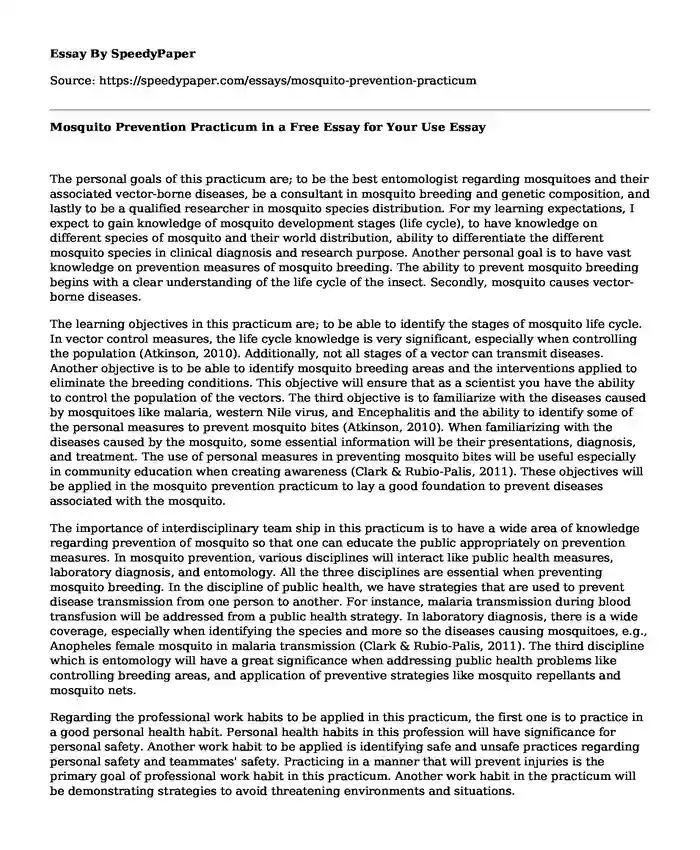
| Type of paper: | Essay |
| Categories: | Health and Social Care Biology |
| Pages: | 3 |
| Wordcount: | 581 words |
The personal goals of this practicum are; to be the best entomologist regarding mosquitoes and their associated vector-borne diseases, be a consultant in mosquito breeding and genetic composition, and lastly to be a qualified researcher in mosquito species distribution. For my learning expectations, I expect to gain knowledge of mosquito development stages (life cycle), to have knowledge on different species of mosquito and their world distribution, ability to differentiate the different mosquito species in clinical diagnosis and research purpose. Another personal goal is to have vast knowledge on prevention measures of mosquito breeding. The ability to prevent mosquito breeding begins with a clear understanding of the life cycle of the insect. Secondly, mosquito causes vector-borne diseases.
The learning objectives in this practicum are; to be able to identify the stages of mosquito life cycle. In vector control measures, the life cycle knowledge is very significant, especially when controlling the population (Atkinson, 2010). Additionally, not all stages of a vector can transmit diseases. Another objective is to be able to identify mosquito breeding areas and the interventions applied to eliminate the breeding conditions. This objective will ensure that as a scientist you have the ability to control the population of the vectors. The third objective is to familiarize with the diseases caused by mosquitoes like malaria, western Nile virus, and Encephalitis and the ability to identify some of the personal measures to prevent mosquito bites (Atkinson, 2010). When familiarizing with the diseases caused by the mosquito, some essential information will be their presentations, diagnosis, and treatment. The use of personal measures in preventing mosquito bites will be useful especially in community education when creating awareness (Clark & Rubio-Palis, 2011). These objectives will be applied in the mosquito prevention practicum to lay a good foundation to prevent diseases associated with the mosquito.
The importance of interdisciplinary team ship in this practicum is to have a wide area of knowledge regarding prevention of mosquito so that one can educate the public appropriately on prevention measures. In mosquito prevention, various disciplines will interact like public health measures, laboratory diagnosis, and entomology. All the three disciplines are essential when preventing mosquito breeding. In the discipline of public health, we have strategies that are used to prevent disease transmission from one person to another. For instance, malaria transmission during blood transfusion will be addressed from a public health strategy. In laboratory diagnosis, there is a wide coverage, especially when identifying the species and more so the diseases causing mosquitoes, e.g., Anopheles female mosquito in malaria transmission (Clark & Rubio-Palis, 2011). The third discipline which is entomology will have a great significance when addressing public health problems like controlling breeding areas, and application of preventive strategies like mosquito repellants and mosquito nets.
Regarding the professional work habits to be applied in this practicum, the first one is to practice in a good personal health habit. Personal health habits in this profession will have significance for personal safety. Another work habit to be applied is identifying safe and unsafe practices regarding personal safety and teammates' safety. Practicing in a manner that will prevent injuries is the primary goal of professional work habit in this practicum. Another work habit in the practicum will be demonstrating strategies to avoid threatening environments and situations.
eferences
Atkinson, P. W. (2010). Vector biology, ecology and control. Dordrecht: Springer.
Clark, G. G., & Rubio-Palis, Y. (September 01, 2011). Mosquito Vector Biology and Control in
Latin America—A 21st Symposium. Journal of the American Mosquito Control Association, 27, 3, 280-299.
Cite this page
Mosquito Prevention Practicum in a Free Essay for Your Use. (2019, Dec 13). Retrieved from https://speedypaper.net/essays/mosquito-prevention-practicum
Request Removal
If you are the original author of this essay and no longer wish to have it published on the SpeedyPaper website, please click below to request its removal:
- Time Management Essay Sample
- Mexican Culture and Military History, Essay Example for Your Study
- The Odyssey Book XI Close Reading and Critical Analysis Essay Sample
- University Entrance Personal Statement Essay Sample
- Essay Sample on Determinism, Libertarianism, and Compatibilism
- Should Drugs Be Legalized? Paper Example
- Westchester County Department
Popular categories




